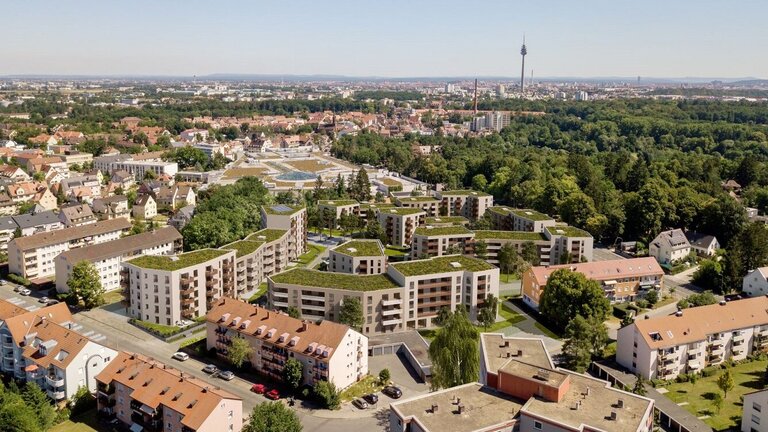Stein/Nuremberg, Germany, 14 March 2022. In the town of Stein near Nuremberg in Central Franconia, a neighborhood called Krügelpark is under construction that focuses on the well-being and community aspects of its residents. It will have 254 rental apartments spread across seven buildings; 69 of the apartments are publicly subsidized. Completion of the first construction phases is scheduled for mid-2023. It is one of Stein's most ambitious construction projects to date and the biggest in the history of Schultheiß Projektentwicklung AG, a leading developer in the Nuremberg region. The Munich and Nuremberg teams of Drees & Sommer SE, a consulting firm specializing in the construction and real estate sector, are providing support for the construction project.
Characterless rows of houses are a thing of the past. The Krügelpark neighborhood brings the charm of a small town to the Stein metropolitan region in Central Franconia. It offers its residents a quiet home in the middle of greenery, yet very close to the city.
The project by Schultheiß Projektentwicklung AG will build urgently needed apartments on a derelict commercial site. ‘We want to set a good example of how to ease the situation on the highly competitive housing market. Through our neighborhood projects, we construct appealing apartments in a delightful setting. This is also aimed at those people and families who have fewer and fewer opportunities to find an affordable home on the housing market. Subsidized housing is still rare in German urban areas. As a result, we have also sometimes specialized in this as a project developer,’ explains Michael Kopper, CEO of Schultheiß Projektentwicklung AG.
Renting an Apartment Instead of Buying Furniture
On the site of the former furniture giant Krügel, a residential project is being realized that stands out not least for its architectural style. Each building consists of polygonal structures, creating an unusual appearance. The flat-roofed buildings with two- to four-bedroom apartments vary in height. Extensive outdoor facilities include trees, adding green oases of quietness to the traffic-calmed neighborhood. A sophisticated approach to mobility encourages the use of climate-friendly means of transport. ‘This enables residents to easily make use of public transport. They also have the option of car sharing, renting a cargo bike, or using their own bicycle,’ says Michael Kopper. By using renewable energy to energy-efficient standards, the neighborhood is sustainable in terms of energy. To make it even more family-friendly, the district has its own day-care center with around 100 places. The immediate vicinity boasts a natural idyllic area of meadows and fields, while the Rednitzgrund nature reserve is just a stone's throw away. Nuremberg's city limits are as close as the border to the northeast, with then only around six kilometers to the city center.
Venturing Great Things in Times of Crisis
Stuttgart-based construction consultancy Drees & Sommer SE is assisting the developer in both project planning and execution, using what is known as lean construction management (LCM). In very simple terms, it is a management method to ensure lean, efficient processes during construction. Drees & Sommer project head Elisabeth Gritsch explains: ‘Despite the uncertain times due to the COVID-19 pandemic, this major project was tackled and the planning was successfully accomplished in this difficult phase. Our experience at Drees & Sommer alone, obtained from more than 500 lean projects that we have implemented, demonstrates that when lean construction management is applied correctly and consistently, it greatly improves communication, processes, and quality on the construction site. Risks and conflicts are identified and avoided in good time, with the result that the course of the project is stable and transparent.’
The goal of lean construction management is now to ensure stability in the ongoing phases of the project, and to enable the finishing trades to start their work on schedule. It is an essential approach: after all, the 250 or so residential units are being built in parallel. In October 2021, after a two-year planning and coordination period, the first brick was laid together with the Mayor of Stein, Kurt Krömer.
For further information visit www.kruegelpark.de.
